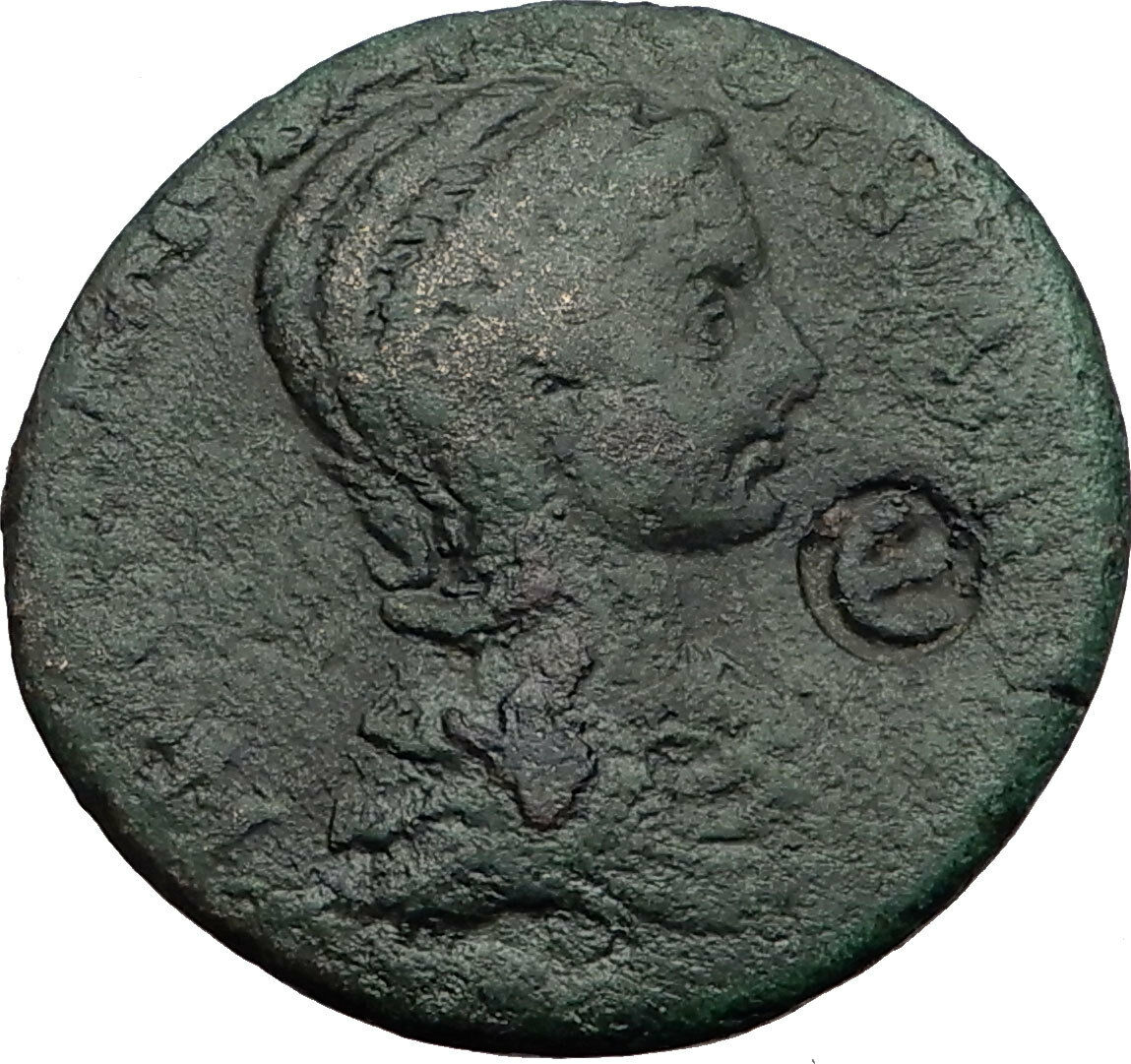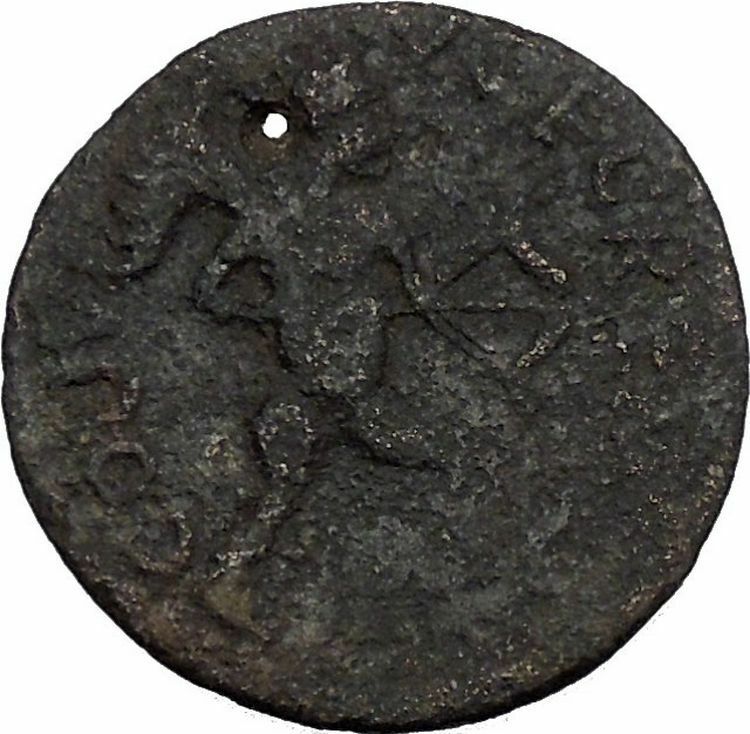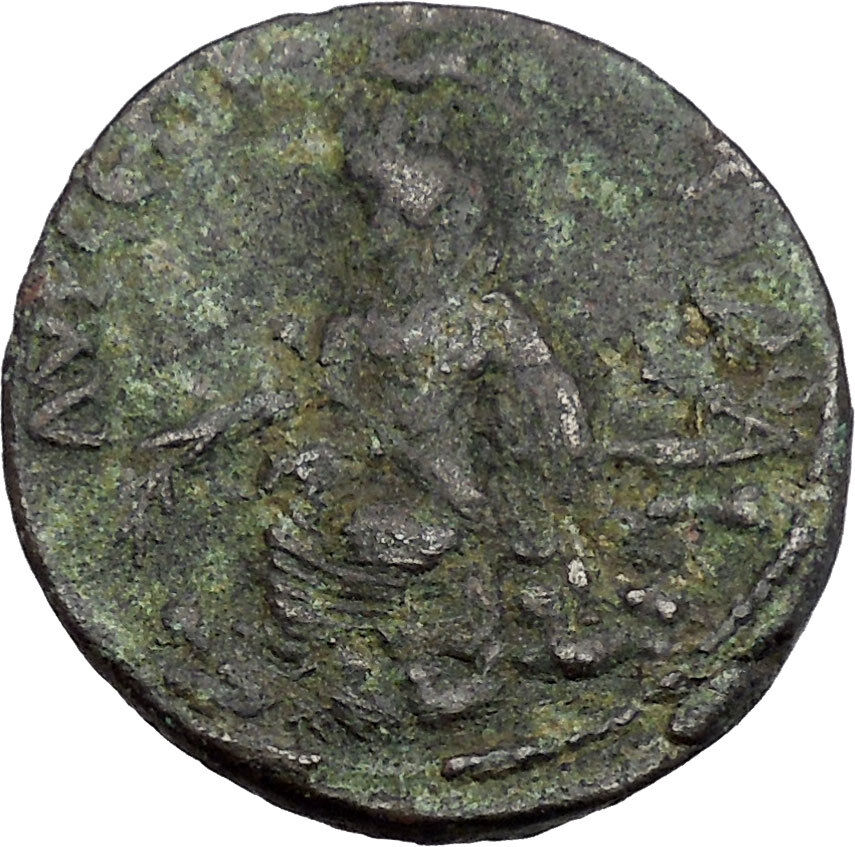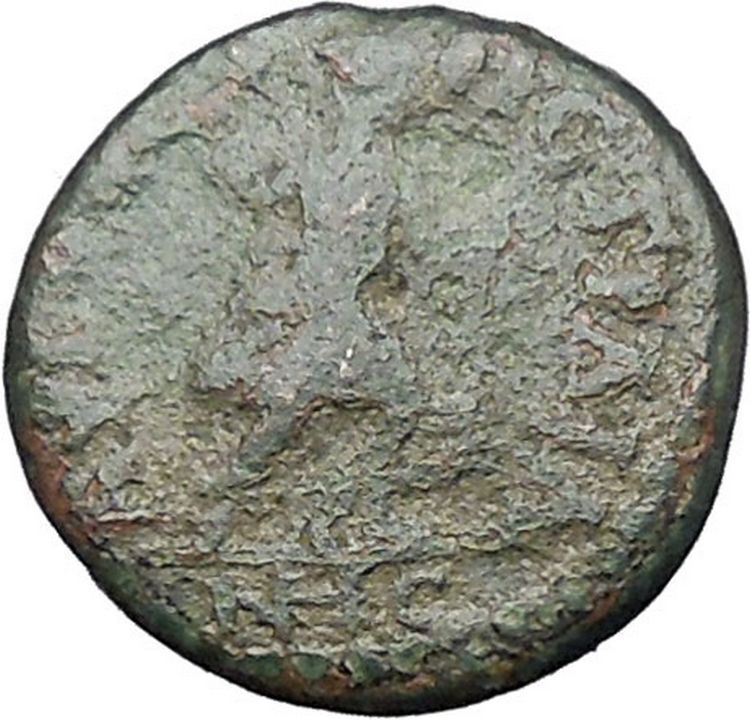|
Antoninus Pius – Roman Emperor: 138-161 A.D.
Bronze 23mm of Anchialus in Thrace
Certification: NGC Ancients VF 5873010-009
Bare head of Antoninus Pius right.
ANXIAΛЄΩN, Cybele enthroned left, holding patera and resting on drum.
You are bidding on the exact item pictured, provided with a Certificate of Authenticity and Lifetime Guarantee of Authenticity.
 Rhea (known by Romans as Cybele), an ancient Greek goddess, appears to have been a goddess of the earth. She is represented as a daughter of Uranus and Ge, and the wife of Cronos, by whom she became the mother of Hestia, Demeter, Hera, Hades, Poseidon and Zeus. Cronos devoured all his children by Rhea, hut when she was on the point of giving birth to Zeus, she went to Lyctus in Crete, by the advice of her parents. When Zeus was born she gave to Cronos a stone wrapped up like an infant, which the god swallowed supposing it to be his child. Crete was undoubtedly the earliest seat of the worship of Rhea; though many other parts of Greece laid claim to the honor of being the birth-place of Zeus. Rhea was afterwards identified by the Greeks in Asia Minor with the Great Asiatic goddess, known under the name of ” the Great Mother,”‘ or the ” Mother of the Gods,” and also bearing other names such as Cybele, Agdistis, Dindymene. Hence her worship became of a wild and enthusiastic character, and various Eastern rites were added to it, which soon spread throughout the whole of Greece. From the orgiastic nature of these rites, her worship became closely connected with that of Dionysus (Dionysos). Under the name of Cybele her worship was universal in Phrygia. Under the name of Agdistia, she was worshipped with great solemnity at Pessinus in Galatia, which town was regarded as the principal seat of her worship. Under different names we might trace the worship of Rhea even much further east, as far as the Euphrates and even Bactriana. She was, in fact, the great goddess of the Eastern world, and we find her worshipped there under a variety of forms and names. As regards the Romans, they had from the earliest times worshipped Jupiter and his mother Ops, the wife of Saturn. During the war with Hannibal (2nd Punic War) the Romans fetched the image of the Mother of the Gods from Pessinus ; but the worship then introduced was quite new to them, and either maintained itself as distinct from the worship of Ops, or became united with it. A temple was built to her on the Palatine, and the Roman matrons honored her with the festival of the Megalesia. In all European countries Rhea was conceived to be Rhea (known by Romans as Cybele), an ancient Greek goddess, appears to have been a goddess of the earth. She is represented as a daughter of Uranus and Ge, and the wife of Cronos, by whom she became the mother of Hestia, Demeter, Hera, Hades, Poseidon and Zeus. Cronos devoured all his children by Rhea, hut when she was on the point of giving birth to Zeus, she went to Lyctus in Crete, by the advice of her parents. When Zeus was born she gave to Cronos a stone wrapped up like an infant, which the god swallowed supposing it to be his child. Crete was undoubtedly the earliest seat of the worship of Rhea; though many other parts of Greece laid claim to the honor of being the birth-place of Zeus. Rhea was afterwards identified by the Greeks in Asia Minor with the Great Asiatic goddess, known under the name of ” the Great Mother,”‘ or the ” Mother of the Gods,” and also bearing other names such as Cybele, Agdistis, Dindymene. Hence her worship became of a wild and enthusiastic character, and various Eastern rites were added to it, which soon spread throughout the whole of Greece. From the orgiastic nature of these rites, her worship became closely connected with that of Dionysus (Dionysos). Under the name of Cybele her worship was universal in Phrygia. Under the name of Agdistia, she was worshipped with great solemnity at Pessinus in Galatia, which town was regarded as the principal seat of her worship. Under different names we might trace the worship of Rhea even much further east, as far as the Euphrates and even Bactriana. She was, in fact, the great goddess of the Eastern world, and we find her worshipped there under a variety of forms and names. As regards the Romans, they had from the earliest times worshipped Jupiter and his mother Ops, the wife of Saturn. During the war with Hannibal (2nd Punic War) the Romans fetched the image of the Mother of the Gods from Pessinus ; but the worship then introduced was quite new to them, and either maintained itself as distinct from the worship of Ops, or became united with it. A temple was built to her on the Palatine, and the Roman matrons honored her with the festival of the Megalesia. In all European countries Rhea was conceived to be accompanied by the Curetes, who are inseparably connected with the birth and bringing up of Zeus in Crete, and in Phrygia by the Corybantes, Atys, and Agdistis. The Corybantes were her enthusiastic priests, who with drums, cymbals, horns, and in full armor, performed their orgiastic dances in the forests and on the mountains of Phrygia. In Rome the Galli were her priests. The lion was sacred to her. In works of art she is usually represented seated on a throne, adorned with the mural crown, from which a veil hangs down. Lions appear crouching on the right and left of her throne, and sometimes she is seen riding in a chariot drawn by lions. accompanied by the Curetes, who are inseparably connected with the birth and bringing up of Zeus in Crete, and in Phrygia by the Corybantes, Atys, and Agdistis. The Corybantes were her enthusiastic priests, who with drums, cymbals, horns, and in full armor, performed their orgiastic dances in the forests and on the mountains of Phrygia. In Rome the Galli were her priests. The lion was sacred to her. In works of art she is usually represented seated on a throne, adorned with the mural crown, from which a veil hangs down. Lions appear crouching on the right and left of her throne, and sometimes she is seen riding in a chariot drawn by lions.
Pomorie (Bulgarian: Поморие; formerly known as Αγχίαλος Anchialos in Greek, Anchialus in Latin) is a town and seaside resort in southeastern Bulgaria, located on a narrow rocky peninsula in Burgas Bay on the southern Bulgarian Black Sea Coast. It is located in Burgas Province 20 km from Burgas and 18 km from Sunny Beach. The ultrasaline lagoon Lake Pomorie, the northernmost of the Burgas Lakes, lies in the immediate proximity. It is the center of Pomorie Municipality.
Pomorie is an ancient city and today an important tourist destination. As of September 2005 it has a population of 14,600 and the mayor is Petar Zlatanov. It lies at  42°33′N 27°39′E / 42.55°N 27.65°E / 42.55; 27.65. 42°33′N 27°39′E / 42.55°N 27.65°E / 42.55; 27.65.
Possibly founded in the 5th or 4th century BC as a colony of Apollonia (today Sozopol), Anchialos was mentioned in Strabo’s Geographica as a small town. It was briefly captured by Messembria (Nesebar) in the 2nd century BC, but reconquered by Apollonia and its fortified walls destroyed. The name Anchialos is derived from Ancient Greek “anchi-” (“near, close to”) and “als-” (either “salt” or a poetic and uncommon word for “sea”).
The western Black Sea coast was ultimately conquered by the Romans under Marcus Licinius Crassus in 29-28 BC after continuous campaigns in the area since 72-71. The fortified wall was meanwhile rebuilt, as evidenced by Ovid in 9 AD en route to Tomis. In the early 1st century AD Anchialos was the centre of a strategia of the vassal Odrysian kingdom, and the town had a Thracian population in the 6th century AD according to the early Byzantine historian Procopius. As the Odrysian kingdom’s self-independence was abolished in 45 AD, Anchialos became part of the Roman province of Thrace and was formally proclaimed a city under Emperor Trajan. At the time the city controlled a vast territory bordering that of Augusta Trajana (Stara Zagora) and reaching the Tundzha to the west, bordering that of Messembria to the north and the southern shore of Lake Burgas to the south. Anchialos acquired the appearance of a Roman city and thrived considerably in the 2nd and 3rd century under the Severan Dynasty, seving as the most important import and export station of Thrace.
 Antoninus Pius – 138-161 A.D. Antoninus Pius – 138-161 A.D.
Caesar: 138 A.D. (under Hadrian)
Augustus: 138-161 A.D.
| Adopted son and successor of Hadrian | Husband of Faustina Senior | Father of Faustina Junior and Galerius Antoninus | Grandfather of Commodus, Annius Verus, Lucilla and Aurelius Antoninus | Adoptive father of Marcus Aurelius and Lucius Verus |
Titus Aurelius Fulvus Boionius Arrius Antoninus (19 September 86 – 7 March 161), generally known in English as Antoninus Pius was Roman emperor from 138 to 161. He was the fourth of the Five Good Emperors and a member of the Aurelii. He did not possess the sobriquet “Pius” until after his accession to the throne. Almost certainly, he earned the name “Pius” because he compelled the Senate to deify his adoptive father Hadrian; the Historia Augusta, however, suggests that he may have earned the name by saving senators sentenced to death by Hadrian in his later years.
He was the son and only child of Titus Aurelius Fulvus, consul in 89 whose family came from Nemausus (modern Nîmes) and was born near Lanuvium and his mother was Arria Fadilla. Antoninus’ father and paternal grandfather died when he was young and he was raised by Gnaeus Arrius Antoninus, his maternal grandfather, a man of integrity and culture and a friend of Pliny the Younger. His mother married to Publius Julius Lupus (a man of consular rank), Suffect Consul in 98, and bore him a daughter called Julia Fadilla.
As a private citizen between 110 and 115, he married Annia Galeria Faustina the Elder. They had a very happy marriage. She was the daughter of consul Marcus Annius Verus and Rupilia Faustina (a half-sister to Roman Empress Vibia Sabina). Faustina was a beautiful woman, renowned for her wisdom. She spent her whole life caring for the poor and assisting the most disadvantaged Romans.
Having filled with more than usual success the offices of quaestor and praetor, he obtained the consulship in 120; he was next appointed by the Emperor Hadrian as one of the four proconsuls to administer Italia, then greatly increased his reputation by his conduct as proconsul of Asia. He acquired much favor with the Emperor Hadrian, who adopted him as his son and successor on 25 February, 138, after the death of his first adopted son Lucius Aelius, on the condition that Antoninus would in turn adopt Marcus Annius Verus, the son of his wife’s brother, and Lucius, son of Aelius Verus, who afterwards became the emperors Marcus Aurelius and Lucius Verus (colleague of Marcus Aurelius).
Emperor
On his accession, Antoninus’ name became “Imperator Caesar Titus Aelius Hadrianus Antoninus Augustus Pontifex Maximus”. One of his first acts as Emperor was to persuade the Senate to grant divine honours to Hadrian, which they had at first refused; his efforts to persuade the Senate to grant these honours is the most likely reason given for his title of Pius (dutiful in affection; compare pietas). Two other reasons for this title are that he would support his aged father-in-law with his hand at Senate meetings, and that he had saved those men that Hadrian, during his period of ill-health, had condemned to death. He built temples, theaters, and mausoleums, promoted the arts and sciences, and bestowed honours and financial rewards upon the teachers of rhetoric and philosophy.
In marked contrast to his predecessors Trajan and Hadrian, Antoninus was not a military man. One modern scholar has written “It is almost certain not only that at no time in his life did he ever see, let alone command, a Roman army, but that, throughout the twenty-three years of his reign, he never went within five hundred miles of a legion”. His reign was the most peaceful in the entire history of the Principate; while there were several military disturbances throughout the Empire in his time, in Mauretania, Iudaea, and amongst the Brigantes in Britannia, none of them are considered serious. The unrest in Britannia is believed to have led to the construction of the Antonine Wall from the Firth of Forth to the Firth of Clyde, although it was soon abandoned. He was virtually unique among emperors in that he dealt with these crises without leaving Italy once during his reign, but instead dealt with provincial matters of war and peace through their governors or through imperial letters to the cities such as Ephesus (of which some were publicly displayed). This style of government was highly praised by his contemporaries and by later generations.
Of the public transactions of this period we have scant information, but, to judge by what we possess, those twenty-two years were not remarkably eventful in comparison to those before and after his; the surviving evidence is not complete enough to determine whether we should interpret, with older scholars, that he wisely curtailed the activities of the Roman Empire to a careful minimum, or perhaps that he was uninterested in events away from Rome and Italy and his inaction contributed to the pressing troubles that faced not only Marcus Aurelius but also the emperors of the third century. German historian Ernst Kornemann has had it in his Römische Geschichte [2 vols., ed. by H. Bengtson, Stuttgart 1954] that the reign of Antoninus comprised “a succession of grossly wasted opportunities,” given the upheavals that were to come. There is more to this argument, given that the Parthians in the East were themselves soon to make no small amount of mischief after Antoninus’ passing. Kornemann’s brief is that Antoninus might have waged preventive wars to head off these outsiders.
Scholars place Antoninus Pius as the leading candidate for fulfilling the role as a friend of Rabbi Judah the Prince. According to the Talmud (Avodah Zarah 10a-b), Rabbi Judah was very wealthy and greatly revered in Rome. He had a close friendship with “Antoninus”, possibly Antoninus Pius, who would consult Rabbi Judah on various worldly and spiritual matters.
After the longest reign since Augustus (surpassing Tiberius by a couple of months), Antoninus died of fever at Lorium in Etruria, about twelve miles (19 km) from Rome, on 7 March 161, giving the keynote to his life in the last word that he uttered when the tribune of the night-watch came to ask the password-“aequanimitas” (equanimity). His body was placed in Hadrian’s mausoleum, a column was dedicated to him on the Campus Martius, and the temple he had built in the Forum in 141 to his deified wife Faustina was rededicated to the deified Faustina and the deified Antoninus.
Historiography
The only account of his life handed down to us is that of the Augustan History, an unreliable and mostly fabricated work. Antoninus is unique among Roman emperors in that he has no other biographies. Historians have therefore turned to public records for what details we know.
In later scholarship
Antoninus in many ways was the ideal of the landed gentleman praised not only by ancient Romans, but also by later scholars of classical history, such as Edward Gibbon or the author of the article on Antoninus Pius in the ninth edition of the Encyclopedia Britannicaca:
A few months afterwards, on Hadrian’s death, he was enthusiastically welcomed to the throne by the Roman people, who, for once, were not disappointed in their anticipation of a happy reign. For Antoninus came to his new office with simple tastes, kindly disposition, extensive experience, a well-trained intelligence and the sincerest desire for the welfare of his subjects. Instead of plundering to support his prodigality, he emptied his private treasury to assist distressed provinces and cities, and everywhere exercised rigid economy (hence the nickname κυμινοπριστης “cummin-splitter”). Instead of exaggerating into treason whatever was susceptible of unfavorable interpretation, he spurned the very conspiracies that were formed against him into opportunities for demonstrating his clemency. Instead of stirring up persecution against the Christians, he extended to them the strong hand of his protection throughout the empire. Rather than give occasion to that oppression which he regarded as inseparable from an emperor’s progress through his dominions, he was content to spend all the years of his reign in Rome, or its neighborhood.
|









 Rhea (known by Romans as Cybele), an ancient Greek goddess, appears to have been a goddess of the earth. She is represented as a daughter of Uranus and Ge, and the wife of Cronos, by whom she became the mother of Hestia, Demeter, Hera, Hades, Poseidon and Zeus. Cronos devoured all his children by Rhea, hut when she was on the point of giving birth to Zeus, she went to Lyctus in Crete, by the advice of her parents. When Zeus was born she gave to Cronos a stone wrapped up like an infant, which the god swallowed supposing it to be his child. Crete was undoubtedly the earliest seat of the worship of Rhea; though many other parts of Greece laid claim to the honor of being the birth-place of Zeus. Rhea was afterwards identified by the Greeks in Asia Minor with the Great Asiatic goddess, known under the name of ” the Great Mother,”‘ or the ” Mother of the Gods,” and also bearing other names such as Cybele, Agdistis, Dindymene. Hence her worship became of a wild and enthusiastic character, and various Eastern rites were added to it, which soon spread throughout the whole of Greece. From the orgiastic nature of these rites, her worship became closely connected with that of Dionysus (Dionysos). Under the name of Cybele her worship was universal in Phrygia. Under the name of Agdistia, she was worshipped with great solemnity at Pessinus in Galatia, which town was regarded as the principal seat of her worship. Under different names we might trace the worship of Rhea even much further east, as far as the Euphrates and even Bactriana. She was, in fact, the great goddess of the Eastern world, and we find her worshipped there under a variety of forms and names. As regards the Romans, they had from the earliest times worshipped Jupiter and his mother Ops, the wife of Saturn. During the war with Hannibal (2nd Punic War) the Romans fetched the image of the Mother of the Gods from Pessinus ; but the worship then introduced was quite new to them, and either maintained itself as distinct from the worship of Ops, or became united with it. A temple was built to her on the Palatine, and the Roman matrons honored her with the festival of the Megalesia. In all European countries Rhea was conceived to be
Rhea (known by Romans as Cybele), an ancient Greek goddess, appears to have been a goddess of the earth. She is represented as a daughter of Uranus and Ge, and the wife of Cronos, by whom she became the mother of Hestia, Demeter, Hera, Hades, Poseidon and Zeus. Cronos devoured all his children by Rhea, hut when she was on the point of giving birth to Zeus, she went to Lyctus in Crete, by the advice of her parents. When Zeus was born she gave to Cronos a stone wrapped up like an infant, which the god swallowed supposing it to be his child. Crete was undoubtedly the earliest seat of the worship of Rhea; though many other parts of Greece laid claim to the honor of being the birth-place of Zeus. Rhea was afterwards identified by the Greeks in Asia Minor with the Great Asiatic goddess, known under the name of ” the Great Mother,”‘ or the ” Mother of the Gods,” and also bearing other names such as Cybele, Agdistis, Dindymene. Hence her worship became of a wild and enthusiastic character, and various Eastern rites were added to it, which soon spread throughout the whole of Greece. From the orgiastic nature of these rites, her worship became closely connected with that of Dionysus (Dionysos). Under the name of Cybele her worship was universal in Phrygia. Under the name of Agdistia, she was worshipped with great solemnity at Pessinus in Galatia, which town was regarded as the principal seat of her worship. Under different names we might trace the worship of Rhea even much further east, as far as the Euphrates and even Bactriana. She was, in fact, the great goddess of the Eastern world, and we find her worshipped there under a variety of forms and names. As regards the Romans, they had from the earliest times worshipped Jupiter and his mother Ops, the wife of Saturn. During the war with Hannibal (2nd Punic War) the Romans fetched the image of the Mother of the Gods from Pessinus ; but the worship then introduced was quite new to them, and either maintained itself as distinct from the worship of Ops, or became united with it. A temple was built to her on the Palatine, and the Roman matrons honored her with the festival of the Megalesia. In all European countries Rhea was conceived to be accompanied by the Curetes, who are inseparably connected with the birth and bringing up of Zeus in Crete, and in Phrygia by the Corybantes, Atys, and Agdistis. The Corybantes were her enthusiastic priests, who with drums, cymbals, horns, and in full armor, performed their orgiastic dances in the forests and on the mountains of Phrygia. In Rome the Galli were her priests. The lion was sacred to her. In works of art she is usually represented seated on a throne, adorned with the mural crown, from which a veil hangs down. Lions appear crouching on the right and left of her throne, and sometimes she is seen riding in a chariot drawn by lions.
accompanied by the Curetes, who are inseparably connected with the birth and bringing up of Zeus in Crete, and in Phrygia by the Corybantes, Atys, and Agdistis. The Corybantes were her enthusiastic priests, who with drums, cymbals, horns, and in full armor, performed their orgiastic dances in the forests and on the mountains of Phrygia. In Rome the Galli were her priests. The lion was sacred to her. In works of art she is usually represented seated on a throne, adorned with the mural crown, from which a veil hangs down. Lions appear crouching on the right and left of her throne, and sometimes she is seen riding in a chariot drawn by lions. 42°33′N 27°39′E / 42.55°N 27.65°E / 42.55; 27.65.
42°33′N 27°39′E / 42.55°N 27.65°E / 42.55; 27.65. Antoninus Pius – 138-161 A.D.
Antoninus Pius – 138-161 A.D.




